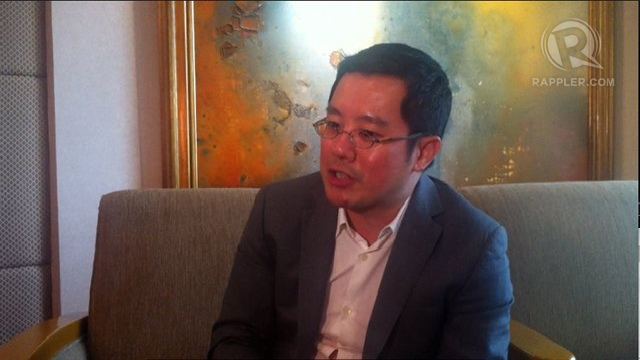SUMMARY
This is AI generated summarization, which may have errors. For context, always refer to the full article.

MANILA, Philippines – The Department of Justice (DOJ) is giving more priority to more serious cybercrimes like hacking, phishing and child pornography than online libel.
“We never had an Internet [or] onIine libel. The position of the DOJ has been very consistent: Online libel is not needed. Cybercrime prevention has to do with core cybercrimes. What are these? Hacking, phishing, using it for child pornography. Those are the bigger cases, so that’s where we must divert our attention and resources,” DOJ Assistant Secretary Geronimo Sy said in a mix of Filipino and English on Wednesday, February 19.
Sy also heads the DOJ’s Office of Cybercrime, which is tasked to implement Republic Act 10175 or the Cybercrime Prevention Act of 2012.
The Supreme Court ruled online libel to be constitutional on Tuesday, February 18, when it is applied to the original author of defamatory information. (READ: SC rules online libel constitutional) But Sy said pursuing online libel cases is not among its priorities in law enforcement.
“Our legal position on libel, it’s not there. It’s not a priority in terms of criminal law enforcement. Mas maraming malalang problema (There are graver problems). With or without that [Cybercrime law], we will use existing legal framework to deal with libel issue. We don’t need it,” Sy explained.
His statement comes on the same day that President Benigno Aquino III welcomed the SC ruling, saying it does not make sense to exempt the Internet from libel just because it’s a different medium.
Online libel was seen as an affront to civil liberties by critics. (WATCH: Cybercrime law constitutional – SC)
Case build-up
National Bureau of Investigation (NBI) Cybercrime Division Ronald Aguto also said the build-up of online libel cases will be “challenging” given the cybercrime’s “borderless” nature.
“US DOJ won’t act on it, because hindi criminalized sa kanila ang ano (online libel) eh… So malaki ang chance na walang mangyayari,” he said, adding that cooperation by another country through a mutual assistance legal treaty will be hard to come by.
(US DOJ won’t act on it, because online libel is not criminalized there… So there’s a huge chance that nothing will happen.)
Sy said the difference in technology will inevitably affect the impact of a defamatory statement.
“Siyempre, mas mabigat ang pag-upload. Kasi ang diperensiya din pag nag-upload ka ng isang private video, kung sa traditional media yan, pwede mong sunugin, pwede mong punitin, pwede mong i-shred. Pero kung i-upload mo yan sa social media once it is uploaded, hindi mo na mabubura iyan. Eh paano kung 16-year-old na bata iyan, no? Hanggang 80 siya, that picture will always be there posted somewhere in the Web,” he said.
(Of course, uploading on the Internet carries more weight. Because the difference if you upload a private video, if that was through traditional media, you can still get rid of it: burn, tear apart, or shred. But if you upload that on social media, you can’t erase that. What if it was a 16-year-old adolescent? Until he/she turns 80, that picture will always be there posted somewhere on the Web.)
No double jeopardy
Sy explained that online libel was dropped in DOJ’s version of the law, adding that his office will be ready to endorse an enhanced second version of the law to Congress.
Senator Tito Sotto, who proposed the inclusion of online libel in the anti-cybercrime law, said he is glad the SC “sees it the way that Congress [sees] it.”
However, with the SC ruling, a person convicted of online libel can only be punished once.
Libel is punishable by Article 353 of the Revised Penal Code (RPC). Section 7 in the Congress-enacted version of the Cybercrime law, which subjects cyber criminals to penalties outlined even in other laws, was declared unconstitutional when it comes to online libel.
The SC cited the guarantee against double jeopardy or being punished more than once for the same offense – a guarantee outlined in the Constitution – in its ruling on Section 7.
Law enforcement problem
On Section 13 of the law which pertains to the preservation of computer data, Aguto said that requiring telcos to hold information is just one side of law enforcement.
“…yung parati naming sinasabi for the telcos to hold the information, that’s only just one side of it.” Section 13 requires Internet Service Providers (ISPs) to retain traffic data and subscriber information for 6 months.
The data-retention provision of the law enables law enforcement to gather necessary evidence for their case build-up.
Often, he said earlier, victims get to know about a fraud, identity theft, or any other online criminal activity months after the commission of the crime.
“Before we go to the telco to get the information, we need the information back from the platform, like if it’s a Facebook account, we need to get the IP address from the Facebook before you can go to the telcos. It’s like one side of the coin lang (only),” explained Aguto. – Rappler.com
Add a comment
How does this make you feel?
There are no comments yet. Add your comment to start the conversation.